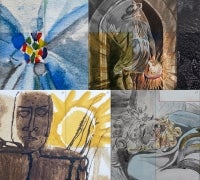
Readymade Emanations: Trianon Press and the Art of Tearing Apart
The Library is pleased to present an exhibit of original materials from the Trianon Press, one of the newest additions to UCSB Library’s Special Research Collections. Please join us for the opening event on October 17.
Arnold Fawcus (1917-1979), an inspired and eccentric bon vivant, had many obsessions -- skiing, French chateaux, blue delphiniums -- but he is most remembered as the founder of Trianon Press, a fine art publisher based in Paris. From 1947 until his death, Fawcus forged strategic collaborations and built a network of suppliers to produce the exquisite volumes seen here.
Among the most notable achievements of Trianon Press were the publication, in partnership with the William Blake Trust, of a series of facsimiles of the works of English poet William Blake (1757-1827), as well as the renewal of interest in French artist Marcel Duchamp (1887-1968) via the first monograph on his work.
Working with talented artisans, Trianon Press perfected a painstaking technique of analyzing and reproducing original artwork by breaking down images into individual color elements, like a kaleidoscope in reverse, in order to put them back together again. This work, which involved building many hand-stenciled layers upon a photographic collotype, was based on techniques that originated in the 19th century and were seen even by the 1940s as antiquated.
This exhibition examines the legacy of Trianon Press, with a particular emphasis on the production elements included with some of its deluxe editions. Through stencils, guide sheets, and progressive color-state prints, the results of Fawcus’s seemingly contradictory impulses become apparent: turning-away from machines, but also bringing rare works and fine art to broader audiences in facsimile. Along the way, viewers are invited to consider the relationship between reproduction and illumination.
The Trianon Press Collection, generously donated by Dean & Kim Pananides, is one of the newest additions to UCSB Library’s Special Research Collections. The Library is sponsoring discussion and curricular collaborations around the collection throughout the 2024-2025 academic year.


